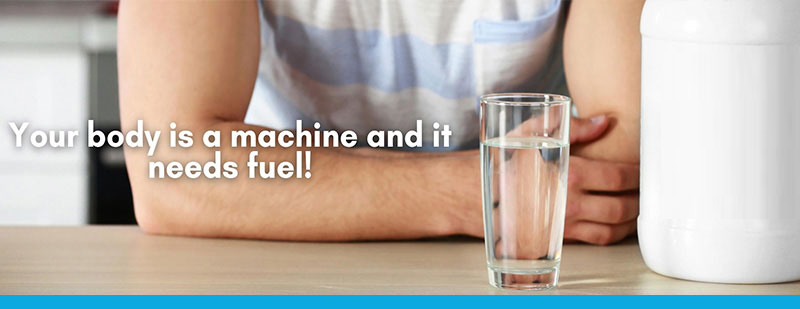IMPROVE YOUR RESISTANCE TO STRESS.
According to the American Institute of Stress, 33% of people suffer from extreme stress. Further to that, 77% of adults suffer from stress that affects their physical health and at least 48% of people have trouble sleeping due to the stress they battle with daily.
Stress is one of the most common ailments we suffer from and we underestimate just how negatively it affects us. From anxiety to weight gain (or loss) to excessive sweating, mental trauma and physical illness, it is so important that we can manage our stress and get it under control to live healthier, more fulfilled lives.
In this blog, we investigate the major stressors in life and how we can increase our resistance to stress through nutrition and effective lifestyle changes.
What causes stress?
The most prominent causes of stress are marriage, divorce, work, personal injury or illness, finances and experiencing the death of a loved one.
Simply, stress is a hormonal response from your body. Starting in the hypothalamus in your brain, signals are sent to your kidneys and nervous system alerting the body to high-danger situations. The kidneys then release adrenaline and cortisol which can cause physical discomfort such as shaking, dizziness, overheating, sweating, cramps, diarrhoea and excessive urination. A spike in blood pressure also occurs.
Your body chemistry changes when you are stressed, further to the adrenalin and cortisol your body also releases glucose. Glucose is responsible for our energy levels, so this sudden surge of extra energy that has nowhere to go causes a physical effect on your body.
Why is prolonged stress so dangerous?
Imagine your body as a well-tuned engine, that is receiving too much oil, and too much petrol and then still being driven hard, all the time. When you are stressed, your pituitary and adrenal glands work overtime pumping out hormones to keep you fueled, but these hormones have nowhere to go. Eventually, over time, your body will begin to become unbalanced and certain parts will get worn out. Constant stress can affect your metabolism, your thyroid, and your anti-ageing hormones and sooner rather than later, your body will succumb to the stress entirely resulting in burnout.
How do you develop stress resistance?
Nutrition
Did you know that what you eat can help you balance your stress levels? Rethink your nutrition and add slow-releasing carbs into your diet. If you are eating lots of sugars and starches, you are actively stimulating the release of cortisol, adding fuel to the already over-bright fire. Avoid cakes, bread and soft drinks. Veggies, nuts and fruits are fantastic slow-release carbs to snack on to keep your cortisol levels down.
Make sure your body is getting all the required nutrients it needs whenever you make a meal.
B vitamins are vital as these are used up quickest when you are stressed, so make sure you keep your body supplemented with the right foods that are full of vitamin B such as whole grains, red meat, chicken, fish, eggs and dairy products, leafy veggies and fruits.
Remember, energy drinks don’t give you wings, they give you anxiety so avoid stimulants that also include coffee, alcohol and sugary drinks.
Exercise
Essential to keep stress levels down, exercise should form part of your daily routine. You want to partake in an exercise that.
- assists with muscle relaxation to fight off tension headaches and cramping.
- expels built-up stress hormones in the body
- releases endorphins to counteract negative feelings.
You want a body that is relaxed, but strong. Posture is so important and stamina is a must to attack daily tasks effectively.
It is important to note however that TOO much exercise can have a negative effect and actually increase stress hormones, so choose your exercise carefully. Balance is everything.
Quite simply, adopt these practices to assist you with developing the strength and resistance to combat your stress:
- 1. Eat slow-releasing carbs and ensure you have the optimal intake of the essential nutrients in your diet.
- 2. Avoid stimulants and depressants.
- 3. Choose an exercise that will leave you relaxed, but make you strong and supple.
- 4. Identify the cause of your stress and find ways to cope with it.
- 5. Practise deep breathing and meditation to energise your body and release tension.
Test your stress
Make note of the symptoms below. If you have 3 or more, you may have an adrenal imbalance and we recommend consulting a professional to assist you with getting your stress under control.
- Battling to get up in the morning
- Constant tiredness
- Food Cravings
- Anger, irritability and aggression
- Poor sleep patterns
- Anxiety
- Constant headaches
- Frequent sore throats
- Daily energy slumps
- Hard to shift weight around the waist
- Unexplained allergies
- Excessive sweating
- Poor wound healing
- Poor memory
Start with identifying what your major stressor is. You can do this by keeping a stress diary and writing down each scenario that makes you feel overwhelmed or anxious. Notice patterns and then make necessary changes. If you do not have control over the situation, other coping techniques like breathing and meditation become even more important.
Here is a small breathing technique to start you off.
Breathe in for 5 seconds and then release your breath for 5 seconds. It’s so simple yet so effective. Breathing is everything.
Stop. Breathe. Assess.
Do not be afraid to reach out for help when you find things become too much. By simply asking for help, you could be saving your life.
Body20 Members have access to the unique FitTrack Programme which is a holistic approach to healthy living.
Book a free demo to find out more about this offering and how Body20 will support you on your way to a stronger, fitter and more mentally healthy you.









